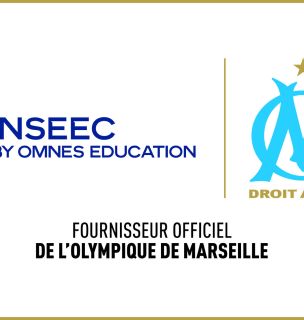MSc International Business Management (100% English)
In an economic context increasingly oriented towards globalization, international exchanges are no longer limited to simple economic exchanges.
Beyond purely commercial issues, we are increasingly confronted with notions of culture, environment, geopolitics and strategy.
The objective of this program is to train future managers to be able to evolve and succeed in the complex and dynamic world of international trade.

A diploma in 1 or 2 years to become an expert in team management and international projects
- First-year MSc course hours: 441 hours
- Second-year MSc course hours: 441 hours
This comprehensive program is designed for students with a professional, business-oriented and international project. Taught entirely in English, the MSc International Business Management trains students for business development but also for other cross-functional positions enabling them to manage the activity and development of an international unit.
The transversal nature of the content will also enable students to have a multicultural approach to markets, allowing the implementation of marketing and sales strategies adapted to different continents.
The objective of this programme is to train future international managers and to provide them with high capabilities to face the challenges and risks to succeed in the dynamic and complex world of international business.
Training Objective
The aim of this program is to train future international managers and equip them with high-level capabilities to confront challenges and risks, enabling success in the dynamic and complex world of international business. In essence, this training seeks to assist them in building their professional success.
How to Apply for the MSc in International Business Management at INSEEC Business School?
Prerequisites
The conditions to access the certification program (excluding Recognition of Prior Learning) are as follows:
- For entry into the 4th year (MSc1): an RNCP level 6 qualification or 180 ECTS credits validated in a relevant field.
- For entry into the 5th year (MSc2): an RNCP level 6 qualification or 240 ECTS credits acquired in a relevant field.
Applicants must prepare a written dossier and also undergo a motivational interview. While not mandatory, a letter of recommendation strengthens the application.
Would you like to know more about the MSc International Business Management programme?
Sign up for an Open Day!
Courses
The courses listed below are examples only and may vary slightly depending on the campus. The content of the courses is adapted each year to market developments and is updated before the start of each new school year.
1st year courses
PROFESSIONAL METHODS AND PRACTICES – 1ST YEAR
PROFESSIONAL REPORT
The Professional Experience Report highlights the experience and skills acquired during the internship by presenting the practical aspects and processes implemented.
PROFESSIONAL TOOLS AND METHODS
This module allows students to improve their CVs and professional demeanor through various activities, including simulations (business games, professional simulations, public speaking, etc.), practical and professional workshops (CV, professional social networks, coaching, etc.), as well as career conferences and master classes.
TECHAWAY NO CODE DATA MARKETING: CRM & MARKETING AUTOMATION
Apply SQL skills to analyze real-world datasets, using complex queries, joins, and subqueries. Analyze customer data and campaign results to improve marketing strategies, using CRM and marketing automation tools for segmentation, targeting, and personalization.
COMPANY STRATEGY & BUSINESS PLAN
This module initially integrates the approach of corporate strategy: from analyzing customer needs, market structure, and competitor dynamics to identifying environmental opportunities and threats. It also aims to teach how to create a Business Plan: from designing a detailed project for the creation or development of a company.
SOFTWARES & DECISION MAKING TECHNIQUES
Ce module a pour objectif l’approfondissement des compétences des apprenants en informatique pour répondre à la demande des entreprises en matière de suivi budgétaire ou commercial, de management de projet, de gestion du personnel et de communication avec notamment Excel, Word, Powerpoint et les outils de travail en équipe. Il vise à être performant sur les outils bureautiques, identifier et corriger rapidement les erreurs, personnaliser les outils existants ou créer ses propres outils.
INTERNATIONAL DEVELOPMENT MANAGEMENT
BUDGET MANAGEMENT & DASHBOARDS
The objective is to acquire key skills in budget management and reporting. The emphasis will be on budget architecture, including the implementation of summary documents, project management control and its connection to budget management, and the creation and monitoring of dashboards.
INTERNATIONAL NEGOTIATION
This seminar focuses on negotiation in an international context. It will specifically address the cultural dimension and its impact on international negotiations. The negotiation process will center around sales through role-playing activities.
INTERNATIONAL LEGAL ENVIRONMENT & BUSINESS LAW
This course aims to introduce legal issues which arise in negotiating, concluding and executing contracts in an international context. Such knowledge will help future global executives anticipate complex transactions abroad. Such transactions may involve contracting parties from several countries and the execution of contractual obligations in several nations.
GEOPOLITICS AND BUSINESS APPROACH
This seminar explores the role of international business and politics and their impact on global current events. From China to the Middle East, and from the United States to Europe, this course embraces such key factors as oil, terrorism, religion, demographics and ecology.
INTERNATIONAL PURCHASING AND SUPPLY CHAIN MANAGEMENT LOGISTICS
This course teaches the fundamentals of the procurement processes used by international corporations. Classes will combine theory and practical applications to illustrate the following key processes and actions: Purchasing Objectives, Procurement Process, Invitation to Tender, Vendor Selection and Management, Contract Negotiation, Supply Chain Management, Service Level Agreements, Quality Assurance, Legal and Contractual Obligations.
GESTION DES PARTENARIATS INTERNATIONAUX
CROSS-CULTURAL MANAGEMENT
In today’s cosmopolitan workplace, corporations have noticed an inability of most managers to successfully work with cultural diversity. The need for cultural awareness is driven by both the increasing internationalization of business brought about by post World War II globalization and the increased desire for diversity in the workplace.
INTERNATIONAL ACCOUNTING
Understanding the accounts of foreign companies. Establish a diagnosis on an activity, a financial situation or the cash flow of a company abroad.
INTERNATIONAL MARKETING
Based on a case-study approach, this course will review classic and web-based marketing strategies, focusing on the international challenges facing today’s global corporations. Students will study – among other approaches – some or all of the following strategic models: Blue Ocean Strategy; Megatrends and the Emergence of Metamarkets; Market Specialty as Differentiation; Customer-Led Business.
INTERNATIONAL TRADE
An introduction to the terminology, basics and initial concepts of international trade. This course provides the students with tools enabling them to think strategically in a global environment.
INTERNATIONAL TEAM MANAGEMENT
INTERNATIONAL BUSINESS DEVELOPMENT
Enable a comprehensive understanding of business development in an international context, taking into account trade regulations and cultural differences.
PROJECT MANAGEMENT
The course of Project Management aims to help individuals and researchers to deepen their knowledge in one of the most important and modern scientific fields. More specifically, its purpose is to provide the necessary resources to individuals wishing to upgrade their professional prospects, by cultivating skills related to the modern methods of designing, monitoring, selection, evaluation methodology and project budgeting.Topics such as the bureaucratic practices of project management, the management principles and the tools used in projects’ execution, the management of human resources and the formulation of an effective policy control, are included in the course, so that learners are able to use effectively the entire range of tools, techniques and methods that make up the main body of knowledge in project management.
INTERNATIONAL COMMUNICATION STRATEGIES
Enable an overview of existing and new communication tools, such as web marketing and social media, and their application to business development. How to deal with new techniques in this rapidly changing field.
FINANCIAL MANAGEMENT
Choice of investments and financing. Discounting and capitalization. Leverage and cost of capital.
Value creation policy. Free cash flow management. Management control. Financial analysis.
FOREIGN LANGUAGE
A second foreign language is mandatory in an international program. French as a foreign language is available for international students.
2nd year courses
INTERNATIONAL DEVELOPMENT STRATEGY- 2ND YEAR
INTERNATIONAL BUSINESS MANAGEMENT
The specificities of managing a business at an international level will be described in this module. Different business regulations, different labor market laws, different business habits and cultural differences may complicate running businesses and the techniques to overcome them and make them an asset will be provided.
CONSUMER BEHAVIOR
This course studies the dynamics of human behavior and its relationship to decision making. It focuses on the most important factors that influence the consumer’s decision process. These include, at the individual level, motivation, personality traits and self-image, values and lifestyles, as well as psychological processes at the social and cultural level. These include group membership, social classes and cultures.
DIGITAL MARKETING
The strategies and techniques of Internet sales will be analyzed as well as the integration of an e-business strategy in the company, the multi-channel and cross-channel strategy to allow loyalty and communicate on the Internet.
INTERNATIONAL MARKETING & MARKET RESEARCH
The first objective of this course is to understand the principles which govern marketing activities in a global environment. The course covers international market entry, product launches, marketing strategies and promotion. Students are expected to make presentations, analyze cases and develop international marketing business plan. The second objective is to master basic theory, tools and actual examples of techniques used in market research. How research can be used to help make informed strategic as well as marketing decisions to help create opportunities/solve real business problems. How to introduce products into different geographic areas.
INTERNATIONAL BUSINESS LAW
This course introduces students to the special legal problems which arise in negotiating, concluding and executing contracts in an international context. International transactions may involve contracting parties from several nations and/or the execution of contractual obligations in several different nations. Special emphasis is given to the question of choice-of-law. The question of the legal implications of e-commerce is also discussed.
INTERNATIONAL DEVELOPMENT MANAGEMENT
INTERNATIONAL NEGOTIATION
Introduces students to the different negotiation techniques with an eye to the cultural context (Europe, USA, North Africa, Asia and Latin America). Participants learn how to use a win/win approach and appreciate the importance of gaining
a sound knowledge of the profile of buyers. The course also stresses the importance of learning and analyzing the key points needed to succeed in negotiation.
INTERNATIONAL RELATIONS & GEOPOLITICS
This course deals with the interplay of Governmental and Corporate interests in our contemporary world. It addresses the different types of power used to obtain global objectives and the hierarchies of power and influence on the planet
today. It also implies the understanding of pressures and processes that drive a company to become an international business.
INTERNATIONAL BUSINESS LAW
This course introduces students to the special legal problems which arise in negotiating, concluding and executing contracts in an international context. International transactions may involve contracting parties from several nations and/or the execution of contractual obligations in several different nations. Special emphasis is given to the question of choice-of-law. The question of the legal implications of e-commerce is also discussed.
TECHAWAY NO CODE DATA MARKETING : CRM & MARKETING AUTOMATION
Apply SQL skills to analyze real-world datasets, using complex queries, joins, and subqueries.
Analyze customer data and campaign results to improve marketing strategies, using CRM and marketing automation tools for segmentation, targeting, and personalization.
SUPPLY CHAIN MANAGEMENT
How purchasing functions in accompany, and the major strategies of purchasing. Determine and prioritize the criteria of choice for a supplier. Import and export in the best conditions. Sourcing and e-sourcing. Management of production. International logistics and development. Drive the supply chain.
THESIS METHODOLOGY
The research thesis is the culmination of the final year of training. Conducted individually with the guidance of a thesis advisor, it allows learners to demonstrate their ability to formulate a problem statement, synthesize key concepts through a literature review, conduct qualitative and/or quantitative research, and finally, make recommendations, outline limitations, and suggest avenues for further research.
INTERNATIONAL PARTNERSHIP MANAGEMENT
INTERNATIONAL PAYMENT METHODS AND INCOTERMS
Incoterms is an abbreviation of « International Commercial Terms » published by the International Chamber of Commerce. Participants are introduced to this set of rules established for the interpretation of the most commonly used trade terms in foreign trade which parties to a contract can agree upon to avoid misunderstandings, disputes and litigation.
INTERNATIONAL FINANCIAL TECNIQUES & FINANCIAL RISK MANAGEMENT
Understand the financial needs associated with basic operations in contemporary international commerce. Acquire the indispensable techniques for international financial management. Learn to choose and use the best tools with a solid approach. Know the financial risks associated with international commerce. Organizations capable of intervention and the main techniques they propose. The importance of short-term finance and cash flow management.
FINANCE OF MAJOR EXPORT CONTRACTS
Understand the financial needs associated with basic operations in contemporary international commerce.
Acquire the indispensable techniques for international financial management.
Learn to choose and use the best tools with a solid approach.
EXPORT STRATEGIES & BUSINESS DEVELOPMENT
Financial risks associated with international commerce.
Organizations capable of intervention and the main techniques they propose.
The importance of short-term finance and cash flow management.
MANAGING INTERNATIONAL TEAMS
INTERNATIONAL HUMAN RESSOURCES MANAGEMENT
In today’s cosmopolitan working world, companies have seen the inability of most managers to work within the framework of cultural diversity. The need for cultural awareness is driven by both the increasing internationalization of businesses due
to globalization and the increased desire for diversity in the workplace.
INTERNATIONAL PROJECT MANAGEMENT
The objective is to prepare students to manage international projects and businesses, with a focus on emerging countries. Special attention is given to developing negotiation and team management skills in an international context.
CHANGE MANAGEMENT
This course aims to inform students about the critical importance of being able to conduct and adapt to change in the decades ahead and to allow them to develop the necessary mindset, skills and toolset to become effective change agents at all levels.
KEY MARKETS & BUSINESS APPROACH
This course deals with the economic, social and political context of business activities throughout a panel of key markets around the world. Special attention is paid to the factors that shape the business environment.
INTERNATIONAL BUSINESS PRACTICES & ETHICS
Understand the rules and principles of ethics in a given economic and commercial context, address moral issues in a context of economic activities, as well as the duties and obligations of the people who deal with them.
PROFESSIONAL TOOLS & METHODS
Resume writing, interview techniques for internship searches, professional project management, team management, and conducting meetings. Negotiation techniques, transactional analysis and NLP, public speaking and managing stage fright, management techniques, and leadership.
FOREIGN LANGUAGE
A second foreign language is offered to enhance learners’ employability.
EXAMS AND SUPPORT
WRITTEN EXAMS
THESIS DEFENSE
2 start dates per year and varying study rhythms
There are two openings per year, in February/March and September/October. To check the opening of each intake, contact the admissions department directly.
The pace of the course may differ from campus to campus and depending on whether the course is carried out under an internship agreement (initial) or a professionalization/apprenticeship contract (continuing).
The work-study contract must be signed for a period of 12 months (MSc2), 24 months (MSc1 + MSc 2) or 18 months for the staggered start of March (continuation of studies in MSc2).

Career opportunities after an MSc International Business Management (100% English)
- Import-export Manager
- Commercial Engineer
- Sales Manager
- Marketing Manager
- Commercial Executive
- Product Manager
What business skills are developed?
- Define and implement the company’s strategic orientations
- Steering the company’s accounting and financial management
- Develop and monitor the implementation of the company’s marketing and sales strategy
- Develop and supervise a policy for the conquest of new international markets with a view to diversifying the company’s activity
- Negotiate purchases and structure all production units in order to optimize the company’s competitiveness and sustainability
- Define the human resources strategy and manage its implementation and follow-up within the company
- Design and support the organizational and managerial change processes of the structure
Professional certification of ”Manager du Développement International “. This is a level 7 (EU) diploma, NSF codes 311 and 312, awarded by INSEEC MSc (CEE-SO, CEE-RA, CEFAS, MBA Institute, CEE-OUEST), registered under number 36492 in the RNCP (Répertoire National des Certifications Professionnelles) by decision of France Compétences on June 1st, 2022.
The certification is issued by capitalization of the totality of the blocks of competences. Each competency of a block must be validated to validate the block of competencies. Partial validation of a block is not possible. It is also accessible through the Validation of Acquired Experience.
Find the blocks of competences associated with this RNCP title by clicking here .
What are the teaching methods?
Teaching methods
- Lectures and interactive courses
- Situational exercises through collective or individual case studies carried out by the students
- Conferences, seminars and educational visits
Evaluation methods
- Individual or group case studies
- Individual and group oral presentations
- Individual and group files
Methods and tools
- The evaluation methods are face-to-face, in the form of continuous assessment or final exams in the form of mid-term exams.
What is the 2024/2025 tuition to enter the program?
Initial training:
- Entry into MSc1: €11 950
- Direct entry into MSc2: €13 350
Apprenticeship:
- 24-month training: €23 950
- Direct entry into MSc2: €13 950
In the context of work-study training, tuition fees are payable by the OPCO and the company signing the contract.
Do you have any questions about work-study or our school in general? Consult our frequently asked questions.
VAE/VAP :
- VAE : €4200 HT
- VAP : €850 HT
International student pack: Mandatory contribution of €490 in addition to the tuition fees indicated above for exclusive support services for international students not coming from the European Union.
What kind of financial aid is available?
INSEEC offers several financial aid schemes:
- The alternating rhythm, in internship or work-study contract
- The right to training via the CPF
- Banking partnerships
key numbers of the programme MSc International Business Management
97%
Overall satisfaction rate with the training program – Class of 2019
86%
Success Rate – Class of 2019
Disabilities
The OMNES Education Group pays particular attention to the societal environment, including the disability dimension. Indeed, we believe that students with disabilities should not have any problems in pursuing their studies and starting a professional career. We accompany them to facilitate their access to the premises, offer them personalized advice as well as adapted accommodations throughout their school career.
Accessibility of premises: all our campuses are accessible to people with disabilities.
To learn more about the OMNES Education Group’s disability policy, click here.
Contacts for disability referents by campus:
Bordeaux : Maxime DOUENS – mdouens@inseec.com
Lyon : Anissa GASMI – agasmi@inseec.com
Rennes : Laura LE CALVEZ – llecalvez@omneseducation.com
Paris : Farid HAMAD– fhamad@inseec.com
Chambéry : Clément BERTACCO – cbertacco@inseec.com
Marseille : Océane VALOTTI – ovalotti@omneseducation.com
News

June 2024
INSEEC hosted the CFNews Grands Prix de la Croissance Externe Sud Ouest for the second year running
Read more




